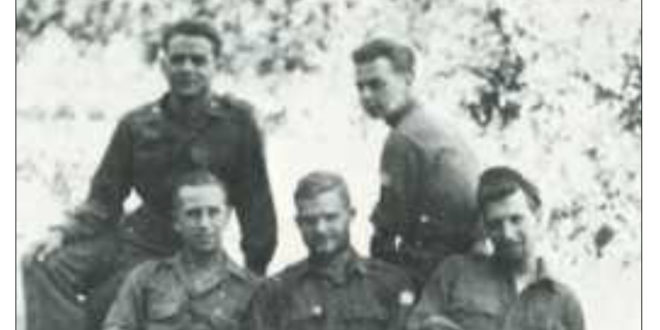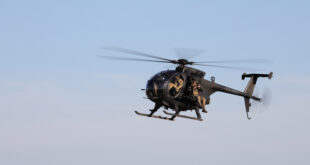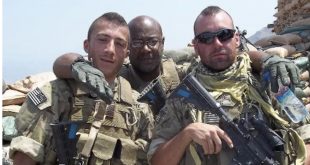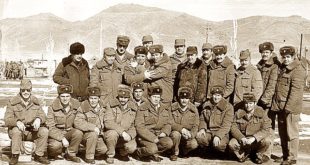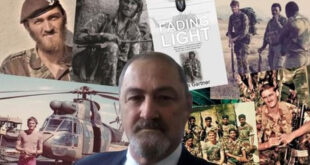
Jack in uniform with his 2 half-brothers at Club de Cazadores del Cerro, Cuba,194
The Son Also Rises: Jack Hemingway From the files of the CIA
Ernest Hemingway was one of the greatest writers of the twentieth century, capturing the quintessential essence of the lost generation. His works are considered classics of American literature for which he was awarded the Pulitzer Prize and the Nobel Prize in Literature. Ernest served as an ambulance driver during World War I before moving to Paris, France to write of the disillusionment and angst of the post-war generation. His debut novel was titled “The Sun Also Rises” and was dedicated to his wife, Hadley Richardson, and their son, John Hadley Nicanor Hemingway, known simply as Jack. The moniker Nicanor was bestowed upon the infant in admiration of the famous Spanish matador, Nicanor Villalta y Serrés.
Jack Hemingway grew up surrounded by some of the most fascinating men and women of the 20th century: artists, poets, musicians, and writers, to include Pablo Picasso, F. Scott Fitzgerald, and Gertrude Stein. He was fluent in French first and then English as well as Austrian. It was his language skills that would later earn him a position with the Office of Strategic Services (OSS).
When Jack was five, his parents divorced but remained in Paris where Jack attended school until he was 11. His mother eventually remarried another accomplished writer and two-time Pulitzer Prize winner, Paul Scott Mowrer. They moved to the United States, and thus began a period of numerous transatlantic crossings for young Jack. Ernest remarried as well, and Jack would travel to Pamplona, Spain to watch the bullfights with his father and step-mother.
At a young age, Ernest introduced Jack to the joys of fishing. The experience ignited a lifelong passion, and fishing became an anchor around which Jack’s memories and milestones were marked and measured.
Fish Tales
Growing up, Jack and his friends roamed the French countryside and ran through the woods playing soldier and fighting imaginary wars. They stared at the sky as it filled with French military planes and made up stories of the missions the pilots were flying. Jack was constantly drilled by a retired French Infantry Colonel, a good friend of Ernest’s. The Colonel would instruct his pupil and then take him to various war memorials and museums to quiz the boy.
It was not surprising then when Jack announced his intentions to enlist in the Marines when World War II broke out. Having grown up in France, Jack was eager to help the country that nurtured his childhood. His mother, however, convinced him he’d be more useful serving as an officer, for which he would need a college degree; and so, in January 1942 Jack enrolled in Dartmouth College. The freedom afforded to college students did not bode well for Jack who instead chose to partake in other popular pastimes on college campuses, which often led to class absences.
Although Jack was distracted from his schoolwork, there was one book that captured and held his attention: “The Officer’s Guide,” given to him by his step-father. He read the book with gusto and was convinced more than ever to pursue a career in the military. At just 19 years old, he left college to play a part in liberating France and Continental Europe.
Jack was assigned to the US Army Military Police (MP), which was disappointing as he’d wanted to join the infantry, the epicenter of action. He was fortunate though to be chosen to attend Officer’s Candidate School where he was the youngest in a class of 200. His prior readings and knowledge of the military helped him graduate in the top 10 percent of his class.
Upon graduation, Jack was assigned to an MP battalion at Fort Devens, Massachusetts. His unit was composed entirely of African American men, many of whom had college degrees to include one from Oxford. Jack recommended these men apply for Officer Candidate School, but their commanding officer refused to support their efforts on account of their race.
Several days before Christmas, Jack deployed to Algeria. Still craving excitement and adventure behind enemy lines, he again applied for a transfer to the Infantry. His request was denied as he was the only French speaking officer in his unit, a skill that would prove to be his golden ticket to the frontlines.
Jack was on a routine inspection of a military installation when he stopped by the mess hall for some chow. While enjoying the delicious French cuisine, he jokingly asked how he could get a transfer to this installation where the food was so marvelous. The commanding officer very seriously asked Jack if he could teach weapons training in French. Jack confirmed he could. The officer told Jack if he were willing to volunteer for hazardous duty, he would process Jack’s application outside of the regular channels. Jack would indeed find the adventure he had been craving.
Bigger Fish to Fry
Three weeks later, Jack was issued a top secret security clearance and was transferred to the OSS. Most of the men in his MP unit had never heard of the OSS and thought it had something to do with entertaining GIs, or sports.
Jack reported to the OSS training camp at Chréa, Algeria; a stunningly beautiful location perched atop a mountain in a cedar forest. He taught classes in demolitions and sabotage, radio operations, encoding and decoding, navigation, unarmed combat, and weapons and tradecraft. He was one of the youngest teachers and one of the few who had not seen action prior to instructing.
All of the students were given fake names upon arrival and were never permitted to discuss their backgrounds. It was widely understood that the less you knew, the better off you’d be if you were captured or tortured.
It was here that Jack was prepped for his first mission. He would parachute into Nazi-occupied France, behind enemy lines, to help with communications and to act as liaison with the local anti-German resistance; to arm and train them and to help them impede German movements in the area.
Jack and his colleague Jim were given “L” pills prior to their jump. These rubber-coated cyanide tablets were guaranteed to end your life in 13 seconds, but it would be a painful demise. They opted to destroy them.
Hook, Line and Sinker
- Jack was concerned he might injure himself if he did a practice jump, so he volunteered to skip training. Jumping out of a hole in the floor of a B-17 was relatively simple and straightforward, Jack surmised, and it seemed illogical to risk injury in practice. Jack did not, however, volunteer to leave behind his fishing rod, which he packed along with the mission supplies. When the officer in charge told Jack he was not permitted to jump with a fishing rod, Jack cunningly responded that it was actually an antenna disguised to look like a fly rod.
Jack, his partner Jim, and the fishing rod all survived the jump and became legendary. The supplies, unfortunately, scattered everywhere and the radio was smashed beyond recognition. To make matters worse, their French counterparts on the ground had not been alerted that two Americans would be arriving with the scheduled supply drop.
Despite the initial confusion, over the next couple of days Jack and Jim were able to provide information on enemy troop movements and dispositions. They also armed the locals and tried to prevent, or at least slow, any attempt by German forces to evacuate through the area.
Something Fishy
While Jim worked laboriously to jerry-rig a radio transmitter, Jack decided to explore the local fishing hole. He meandered down a deep canyon framed by railway lines. Transfixed by the rushing water and the beauty of the day, Jack did not hear the marching boots of the approaching German patrol. When they were finally on the rails above him, he turned to see them wielding rifles and machine pistols.
He prayed silently to not let anything bite his line. If it did, the Germans would surely stop to watch and inevitably the American flag on his uniform would have been exposed. It’s rare for a fisherman to describe a day as good when he didn’t catch anything, but for Jack, it was a very good day indeed and the patrol marched on.
When Jack returned to his post, Jim informed him he had made contact with the OSS and that they were both to report to Voiteur, France.
Taking the Bait
Jack’s new assignment was to recruit, train, and infiltrate agents through enemy lines. In late October 1944, Jack departed for a safe-house in enemy territory. As he neared his destination, a unit of German mountain troops opened fire on him. He was hit three times in the right arm and shoulder before surrendering.
The Germans confiscated his weapons and gave him basic first aid to include a shot of morphine from his own kit. Jack was then blindfolded and taken to the company command post for interrogation, located, ironically, in the very safe-house he had been trying to find.
The interrogation revealed that the commander’s girlfriend had once been Jack’s nurse when he was a child living in Austria. The questioning ended on a joyous note with a toast of Schnapps to the woman of commonality.
Jack was then sent off to a Prisoner of War (POW) camp for officers near Hammelburg, Germany. One day after roll call, a German soldier asked Jack if he was related to Ernest Hemingway. Jack admitted he was. The soldier confessed he was an admirer of his father’s work and stated that he had been an American Literature professor and had taught Ernest’s writings.
Catch and Release
On March 29, 1945, Task Force Baum crushed through the perimeter of the POW camp to the cheers of the applauding prisoners. However, the task force’s intelligence was faulty and they only anticipated 300 POWs, not the 3,000 men now looking for rescue. Only half of the task force’s vehicles were even capable of carrying POWs. Officers were permitted to ride on top of the vehicles, while the rest were encouraged to walk the 50 miles to American lines. Most of the men were in no condition to attempt such a feat and elected to stay behind.
Jack awoke just before daybreak and quickly assessed the situation. He watched as some men voluntarily walked back to the POW camp. He didn’t have confidence that the task force could make it to American lines. He decided to make a break for it on his own. He scurried away and avoided congregating with others who were doing the same. He hadn’t gotten very far when he heard the explosion of the American tanks being blown up by the Germans. Not one of the 57 vehicles of the task force survived the mission.
Casting Doubt
After several days of running, Jack was captured by a German patrol who put him on a train to Nürnberg with the other recovered prisoners. Shortly after his arrival, the Nürnberg camp was evacuated. As the prisoners filed out of the camp, they were mistakenly fired upon by American pilots – much to the amusement of the Germans. Although entertained, the Germans did not want an encore and instructed the prisoners to spell out “US POW” on the ground along the route to avoid any additional friendly-fire. An American P-51 Mustang flew above the prisoners for much of the remainder of the march.
Go Fish
After an exhausting day of marching, the men collapsed into their surroundings for the evening. Settling in, Jack heard the faint trickle of a small steam nearby. Sans fishing rod, but desperate for nourishment, Jack decided to employ a fish-catching technique he learned on the day the German patrol saw him fishing. He had watched a fisherman upstream strategically grab a fish with his bare hands. Jack tried it and was successful in grabbing a seven inch trout. He and two others ate well that night.
Jack, the son of a very famous and influential author, did not want to take any chances. He convinced an enlisted man to switch identities with him, swapping dog-tags and insignia. In exchange, the enlisted man now enjoyed the ‘perks’ of officer-status in the POW camp.
On April 29, 1945, the camp was liberated. Jack linked up with some former OSS colleagues and they hitched a ride to Army HQs where they checked in with the OSS.
Off the Hook
Jack was given priority status to London, where he was debriefed by X2, the OSS counterintelligence section, and then he was on his way to Washington, DC. After reporting to OSS HQS, he was given 2 months leave and almost nine months of accumulated back pay. When the war had started, Jack weighed around 210 pounds. He now weighed under 140.
After his much needed leave, Jack was offered the opportunity to be released from duty; instead he volunteered to go to the Far East with the Special Operations Branch of OSS. He began training for an assignment in Kunming, China the center of Far East operations.
Jack was assessed by the OSS to be quite mature despite his youth. They positively noted that he was highly motivated to serve in the field. His social relations were deemed good. The OSS described him as resourceful, courageous, and sufficiently self-assured to be an excellent operations officer.
Despite his positive evaluation, the end of the war ended Jack’s chance to carry out secret missions in the Far East. Instead he was assigned as a commanding officer at a German POW installation at Camp Pickett, Virginia. The assignment lasted two months.
Reel It In
Jack received the Croix de Guerre from the French government for his wartime service. He was also awarded the Bronze Star Medal from the Army Commander for meritorious service in direct support of combat operations.
Jack was released from the Army in November 1945. He flew to Cuba to visit his father, and then to Utah for a skiing trip with Gary Cooper and Clark Gable. He enrolled at the University of Montana, although he never graduated. While in Missoula, he made up his mind that one day he would settle down in the mountains out west.
Jack married Byra Whittlesey in Paris, France on June 25, 1949. Julia Child, another OSS veteran, was the maid-of-honor. The couple had three children. Jack worked as a stockbroker, and then as a fishing supplies salesman. In 1967, he retired and moved to Ketchum, Idaho, his father’s last home and burial place. There he taught languages, pursued his passion for fly fishing, and wrote two autobiographical books.
Byra died of cancer in 1988 and Jack then married Angela Holvey, whom he remained married to until his death on December 1, 2000, at age 77.
* All photos are from the Ernest Hemingway Photograph Collection at the John F. Kennedy Presidential Library and Museum in Boston, unless otherwise noted in the caption.
Jack hoisted himself up onto a tank and hung on as the group rolled out at 8:00pm under a moonless sky. The route went straight through an area used by the German Army for maneuvers and artillery practice. It didn’t take long for the first ambush to occur. A Panzerfaust antitank weapon (known as a “bazooka” to the Allies) sent Jack flying off his tank and scrambling up another. The ambushes continued until midnight when the Americans hunkered down for the night.After ten days of marching nearly 12 miles a day the men arrived in Bavaria, at the largest POW camp Jack had ever seen. Immediately a rumor spread that several high-profile prisoners were going to be held hostage to ensure the safety of the leading Nazis.
 Soldier of Fortune Magazine The Journal of Professional Adventurers
Soldier of Fortune Magazine The Journal of Professional Adventurers


